高中英语Unit2TheOlympicGames重点句型学案(无答案)新人教版必修2
- 格式:doc
- 大小:77.00 KB
- 文档页数:2
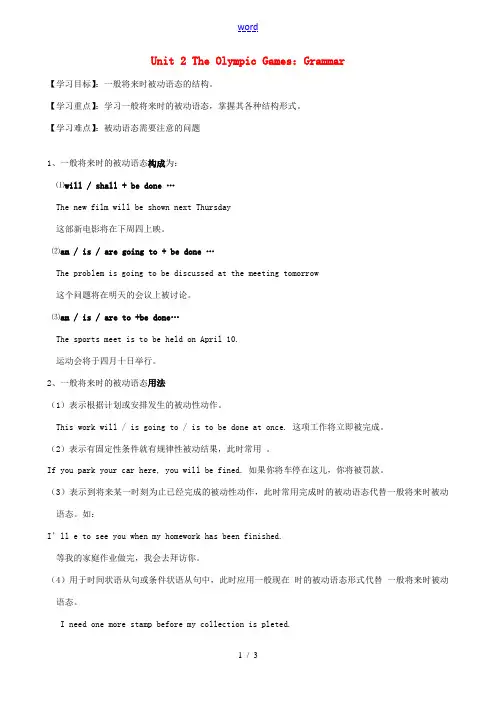
Unit 2 The Olympic Games:Grammar【学习目标】:一般将来时被动语态的结构。
【学习重点】:学习一般将来时的被动语态,掌握其各种结构形式。
【学习难点】:被动语态需要注意的问题1、一般将来时的被动语态构成为:⑴will / shall + be done …The new film will be shown next Thursday这部新电影将在下周四上映。
⑵am / is / are going to + be done …The problem is going to be discussed at the meeting tomorrow这个问题将在明天的会议上被讨论。
⑶am / is / are to +be done…The sports meet is to be held on April 10.运动会将于四月十日举行。
2、一般将来时的被动语态用法(1)表示根据计划或安排发生的被动性动作。
This work will / is going to / is to be done at once. 这项工作将立即被完成。
(2)表示有固定性条件就有规律性被动结果,此时常用。
If you park your car here, you will be fined. 如果你将车停在这儿,你将被罚款。
(3)表示到将来某一时刻为止已经完成的被动性动作,此时常用完成时的被动语态代替一般将来时被动语态。
如:I’ll e to see you when my homework has been finished.等我的家庭作业做完,我会去拜访你。
(4)用于时间状语从句或条件状语从句中,此时应用一般现在时的被动语态形式代替一般将来时被动语态。
I need one more stamp before my collection is pleted.再有一X邮票我的收藏就完整了。
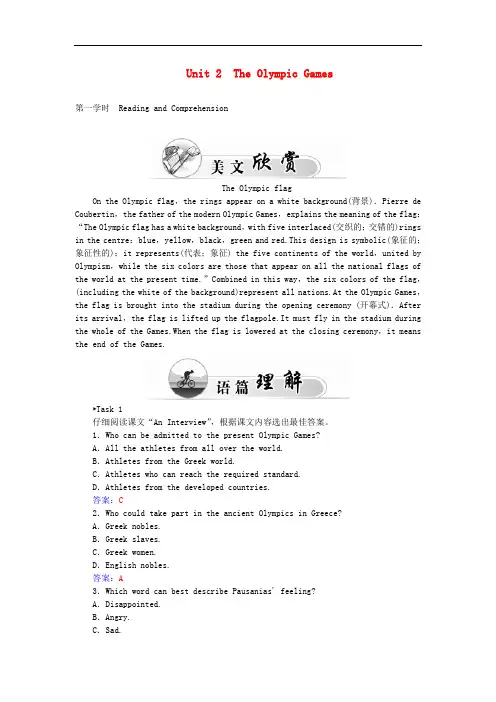
Unit 2 The Olympic Games第一学时Reading and ComprehensionThe Olympic flagOn the Olympic flag,the rings appear on a white background(背景).Pierre de Coubertin,the father of the modern Olympic Games,explains the meaning of the flag:“The Olympic flag has a wh ite background,with five interlaced(交织的;交错的)rings in the centre:blue,yellow,black,green and red.This design is symbolic(象征的;象征性的);it represents(代表;象征) the five continents of the world,united by Olympism,while the six colors are those that appear on all the national flags of the world at the present time.”Combined in this way,the six colors of the flag,(including the white of the background)represent all nations.At the Olympic Games,the flag is brought into the stadium during the opening ceremony (开幕式).After its arrival,the flag is lifted up the flagpole.It must fly in the stadium during the whole of the Games.When the flag is lowered at the closing ceremony,it means the end of the Games.►Task 1仔细阅读课文“An Interview”,根据课文内容选出最佳答案。
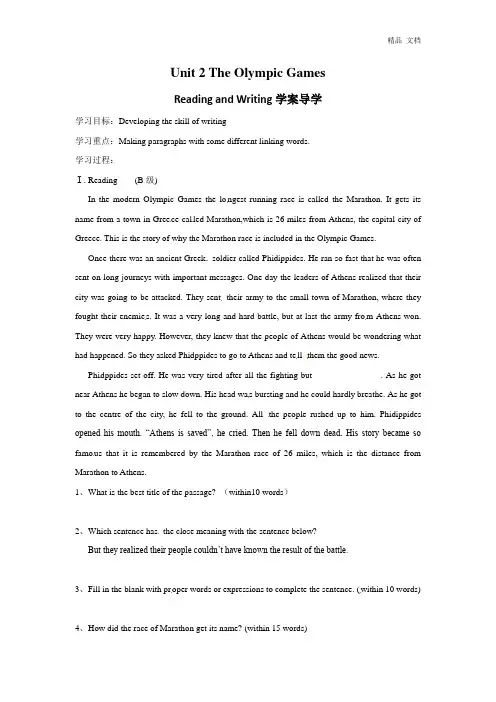
Unit 2 The Olympic GamesReading and Writing学案导学学习目标:Developing the skill of writing学习重点:Making paragraphs with some different linking words.学习过程:Ⅰ. Reading (B级)In the modern Olympic Games the lo ngest running race is called the Marathon. It gets its name from a town in Gree ce cal led Marathon,which is 26 miles from Athens, the capital city of Greece. This is the story of why the Marathon race is included in the Olympic Games.Once there was an ancient Greek soldier called Phidippides. He ran so fast that he was often sent on long journeys with important messages. One day the leaders of Athens realized that their city was going to be attacked. They sent their army to the small town of Marathon, where they fought their enemie s. It was a very long and hard battle, but at last the army fro m Athens won. They were very happy. However, they knew that the people of Athens would be wondering what had happened. So they asked Phidppides to go to Athens and te ll them the good news.Phidppides set off. He was very tired after all the fighting but _______________. As he got near Athens he began to slow down. His head wa s bursting and he could hardly breathe. As he got to the centre of the city, he fell to the ground. All the people rushed up to him. Phidippides opened his mouth. “Athens is saved”, he cried. Then he fell down dead. His story became so famo us that it is remembered by the Marathon race of 26 miles, which is the distance from Marathon to Athens.1、What is the best title of the passage? (within10 words)____________________________________________________________________________ 2、Which sentence has the close meaning with the sentence below?But they realized their people couldn’t have known the result of the battle.____________________________________________________________________________ 3、Fill in the blank with pr oper words or expressions to complete the sentence. (within 10 words)____________________________________________________________________________ 4、How did the race of Marathon get its name? (within 15 words)________________________________________________________________________________________________________________________________________________________ 5、Translate the last sentence of the passage.____________________________________________________________________________ ____________________________________________________________________________ Ⅱ. Read the short passage . (A级)I first became interested in football when I was nine. Now I play in my school team and join my friends for a game every week on a regular basis. It’s fun.My favourite footballer is David Beckham although I also like Ronaldo. They are both excellent and have great skills too.Apart from playing at school I go to sports school every weekend. I learn many skills there, such as passing the ball and scoring. I especially like playing on the wing like Beckham but being a striker is good as well.Ⅲ. Pay attention to the linking words. (A级)the linking wordsto join diff erent ideas together to add information to strengthen differencefirst…second; although; apart from; but; though; however; therefore especially; such as; forexample; too; as well;besides; including; accordingto; s o…that; what’s moreon one hand…on the otherhand; while; every coin hastwo sidesⅣ. Discussion (C级)Atlanta’s favourite sport was running. What’s your favourite sport?﹡how you became interested in that sport﹡your favourite athlete﹡what you do to improve your skillWith these expressions to help you.how you became interested in that sport your favourite athlete what you do to improve yourskillI like …because…I became interested in it when…My favourite athlete is…I like him/her because…I practise…In the future I hope to…Ⅴ.Writing (D级)My favourite sport要求:1. Begin by explaining which sport you like best and why.2. Give reasons for why you like the athlete best.3. What you do to improve your skill.4. Finish by saying what you hope to do with this sport in the future.注意:1. 100词左右。
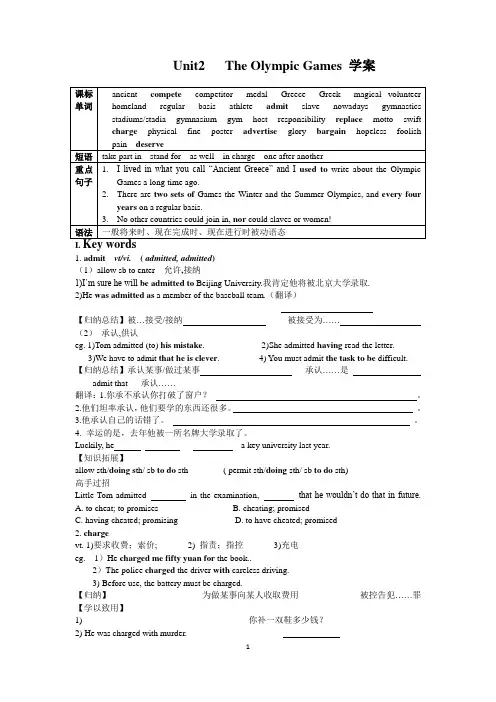
Unit2 The Olympic Games 学案I.1. admit vt/vi. ( admitted, admitted)(1)allow sb to enter 允许,接纳1)I’m sure he will be admitted to Beijing University.我肯定他将被北京大学录取.2)He was admitted as a member of the baseball team.(翻译)_____________________________________________ _____【归纳总结】被…接受/接纳被接受为……(2)承认,供认eg. 1)Tom admitted (to) his mistake. 2)She admitted having read the letter.3)We have to admit that he is clever. 4) You must admit the task to be difficult. 【归纳总结】承认某事/做过某事承认……是admit that 承认……翻译:1.你承不承认你打破了窗户?。
2.他们坦率承认,他们要学的东西还很多。
3.他承认自己的话错了。
4. 幸运的是,去年他被一所名牌大学录取了。
Luckily, he a key university last year.【知识拓展】allow sth/doing s th/ sb to do sth ( permit sth/doing sth/ sb to do sth)高手过招Little Tom admitted in the examination, that he wouldn’t do that in future.A. to cheat; to promisesB. cheating; promisedC. having cheated; promisingD. to have cheated; promised2. chargevt. 1)要求收费;索价; 2) 指责;指控3)充电eg. 1)He charged me fifty yuan for the book..2)The police charged the driver with careless driving.3) Before use, the battery must be charged.【归纳】____________________为做某事向某人收取费用____________被控告犯……罪【学以致用】1)______________________________________你补一双鞋多少钱?2) He was charged with murder.________________________ ______________n. 费用; 主管;负责;eg.1)All goods are delivered free of charge. 一切物品免费送货。
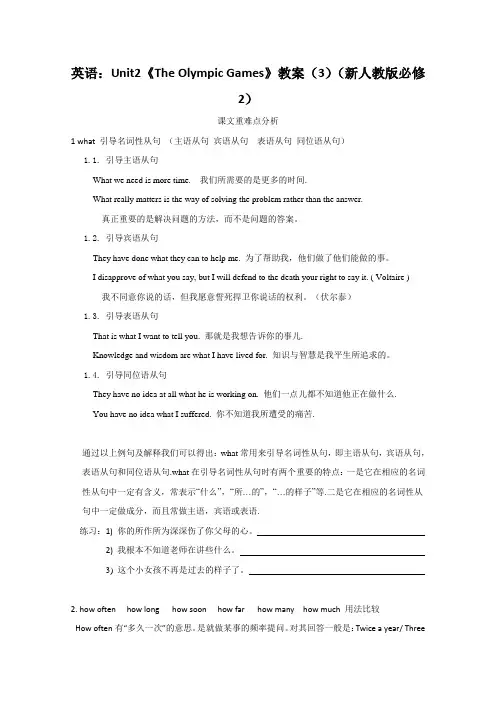
英语:Unit2《The Olympic Games》教案(3)(新人教版必修2)课文重难点分析1 what 引导名词性从句(主语从句宾语从句表语从句同位语从句)1.1. 引导主语从句What we need is more time. 我们所需要的是更多的时间.What really matters is the way of solving the problem rather than the answer.真正重要的是解决问题的方法,而不是问题的答案。
1.2. 引导宾语从句They have done what they can to help me. 为了帮助我,他们做了他们能做的事。
I disapprove of what you say, but I will defend to the death your right to say it. ( Voltaire )我不同意你说的话,但我愿意誓死捍卫你说话的权利。
(伏尔泰)1.3. 引导表语从句That is what I want to tell you. 那就是我想告诉你的事儿.Knowledge and wisdom are what I have lived for. 知识与智慧是我平生所追求的。
1.4. 引导同位语从句They have no idea at all what he is working on. 他们一点儿都不知道他正在做什么.You have no idea what I suffered. 你不知道我所遭受的痛苦.通过以上例句及解释我们可以得出:what常用来引导名词性从句,即主语从句,宾语从句,表语从句和同位语从句.what在引导名词性从句时有两个重要的特点:一是它在相应的名词性从句中一定有含义,常表示“什么”,“所…的”,“…的样子”等.二是它在相应的名词性从句中一定做成分,而且常做主语,宾语或表语.练习:1) 你的所作所为深深伤了你父母的心。
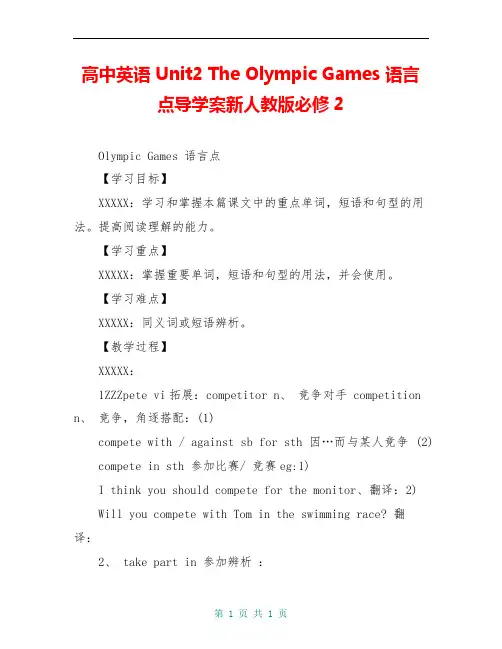
高中英语 Unit2 The Olympic Games 语言点导学案新人教版必修2Olympic Games 语言点【学习目标】XXXXX:学习和掌握本篇课文中的重点单词,短语和句型的用法。
提高阅读理解的能力。
【学习重点】XXXXX:掌握重要单词,短语和句型的用法,并会使用。
【学习难点】XXXXX:同义词或短语辨析。
【教学过程】XXXXX:1ZZZpete vi拓展:competitor n、竞争对手 competition n、竞争,角逐搭配:(1)compete with / against sb for sth 因…而与某人竞争 (2) compete in sth 参加比赛/ 竞赛eg:1)I think you should compete for the monitor、翻译:2)Will you compete with Tom in the swimming race? 翻译:2、 take part in 参加辨析:take part in, join in, join , attend (1)take part in : 指参加会议或群众性活动等,重在说明主语参加该项活动并在其中发挥一定的作用。
(2)join in : 指参加正在进行的活动,如参加竞赛、娱乐、谈话等。
(3)join : 通常指参加某组织或团体,并成为其中的一员。
(4)attend : 正式用语,指参加会议或婚礼、葬礼、典礼或上课、上学、听报告等,强调的是这一动作本身,而不是强调参加者在活动中所起的作用。
eg :1) She didnt come to the party because she had to a meeting、2)He the Labour Party、3)Won’t you us for a drink?4)How many countries will the World Cup?3、 stand for 代表,象征The olive branch (橄榄枝)stands for peace、翻译:拓展:stand out 突出,显眼,引人注目His red hair made him stand out in the crowd、翻译:4、 admit v、允许(人/ 物)进入;让…进入搭配:be admitted to 被…接受/接纳be admitted as 作为…被接纳eg:1)Only one hundred boys are admitted to the school every year、翻译:2)He was admitted as a member of the party last month、翻译:5、 as well也,而且 eg: I can swim as well、翻译:辨析:as well, also, too, either【易混辨析】as well/also/too/either “也,而且”as well用于肯定句,只用于句尾。
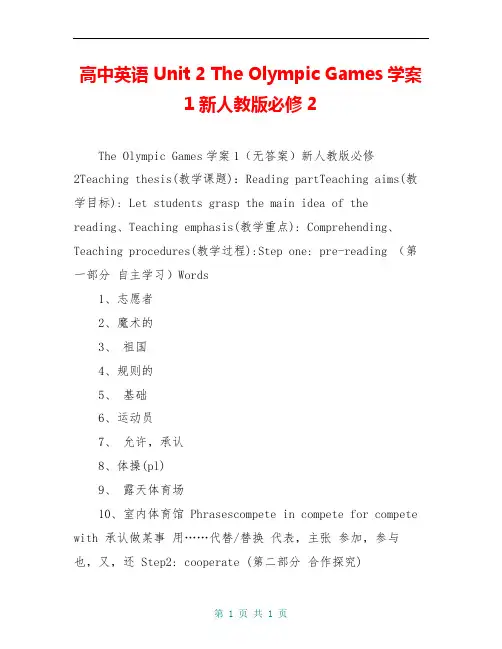
高中英语 Unit 2 The Olympic Games学案1新人教版必修2The Olympic Games学案1(无答案)新人教版必修2Teaching thesis(教学课题):Reading partTeaching aims(教学目标): Let students grasp the main idea of the reading、Teaching emphasis(教学重点): Comprehending、Teaching procedures(教学过程):Step one: pre-reading (第一部分自主学习)Words1、志愿者2、魔术的3、祖国4、规则的5、基础6、运动员7、允许,承认8、体操(pl)9、露天体育场10、室内体育馆 Phrasescompete in compete for compete with 承认做某事用……代替/替换代表,主张参加,参与也,又,还 Step2: cooperate (第二部分合作探究)1、Who are pausanias and Li Yan?2、 How many questions does Pausanias ask and what are they?3、 True or Faulse?a、Pausanias doesn’t feel unexpected that so many things have been changed、b、Pausanias feels surprised that there is no limit to joining the Olympic games、c、 The motto of the Olympics has been replaced、d、 There are two main sets of games in the ancient olympic games、e、 Women and slaves couldn’t take part in Olympic games today、f、 It costs a lot to host the olmpic games、g、 No country wants to host the olympic games、Step3:illustrating(第三部分举例说明)1、admit2、 take part in3、 stand for4、 as wellStep4: Memorising(句型背诵)1、I lived in and I about the Olympic Games a long time ago、2、 do you hold you games?(多久)3、 Every four years、4、 in the summer Olympics you have the running races, together with swimming, sailing and all the team sports、5、There’s much competitionamong countries to host the Olympics to win Olympic medals、Step5: Teaching reflection(教学反思)。
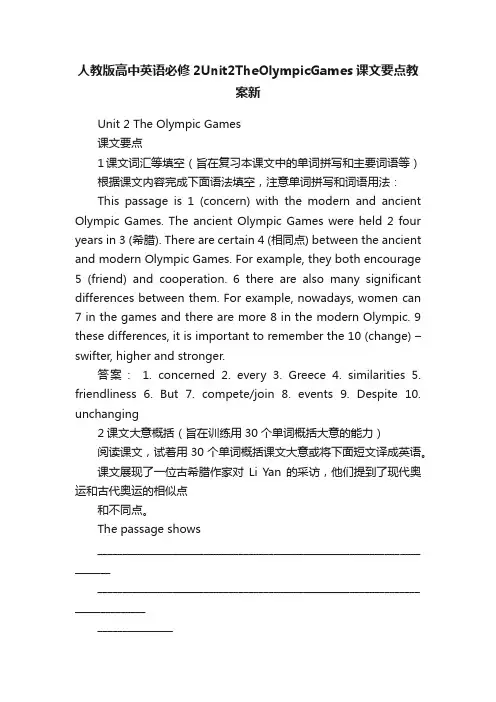
人教版高中英语必修2Unit2TheOlympicGames课文要点教案新Unit 2 The Olympic Games课文要点1课文词汇等填空(旨在复习本课文中的单词拼写和主要词语等)根据课文内容完成下面语法填空,注意单词拼写和词语用法:This passage is 1 (concern) with the modern and ancient Olympic Games. The ancient Olympic Games were held 2 four years in 3 (希腊). There are certain 4 (相同点) between the ancient and modern Olympic Games. For example, they both encourage 5 (friend) and cooperation. 6 there are also many significant differences between them. For example, nowadays, women can 7 in the games and there are more 8 in the modern Olympic. 9 these differences, it is important to remember the 10 (change) –swifter, higher and stronger.答案: 1. concerned 2. every 3. Greece 4. similarities 5. friendliness 6. But 7. compete/join 8. events 9. Despite 10. unchanging2课文大意概括(旨在训练用30个单词概括大意的能力)阅读课文,试着用30个单词概括课文大意或将下面短文译成英语。
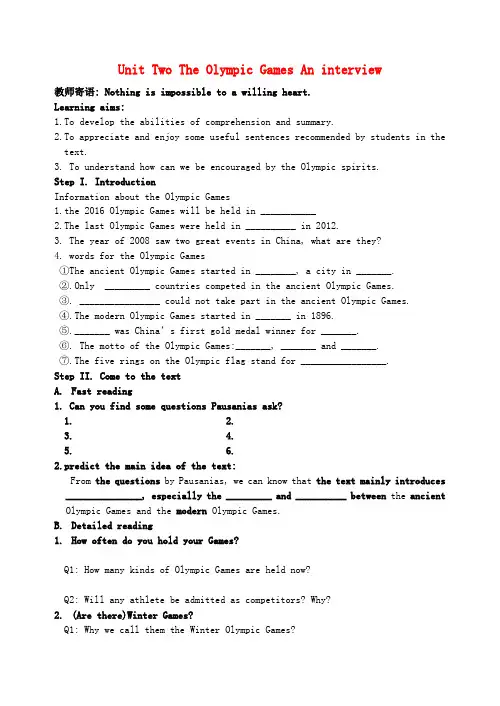
Unit Two The Olympic Games An interview教师寄语: Nothing is impossible to a willing heart.Learning aims:1.To develop the abilities of comprehension and summary.2.To appreciate and enjoy some useful sentences recommended by students in the text.3. To understand how can we be encouraged by the Olympic spirits.Step I. IntroductionInformation about the Olympic Games1.the 2016 Olympic Games will be held in ___________2.The last Olympic Games were held in __________ in 2012.3. The year of 2008 saw two great events in China, what are they?4. words for the Olympic Games①The ancient Olympic Games started in ________, a city in _______.②.Only _________ countries competed in the ancient Olympic Games.③. ________________ could not take part in the ancient Olympic Games.④.The modern Olympic Games started in _______ in 1896.⑤._______ was China’s first gold medal winner for _______.⑥. The motto of the Olympic Games:_______, _______ and _______.⑦.The five rings on the Olympic flag stand for _________________.Step II. Come to the textA.Fast reading1. Can you find some questions Pausanias ask?1. 2.3. 4.5. 6.2.predict the main idea of the text:From the questions by Pausanias, we can know that the text mainly introduces _______________, especially the _________ and __________ between the ancient Olympic Games and the modern Olympic Games.B.Detailed reading1.How often do you hold your Games?Q1: How many kinds of Olympic Games are held now?Q2: Will any athlete be admitted as competitors? Why?2.(Are there)Winter Games?Q1: Why we call them the Winter Olympic Games?Q2: Which events do the Summer Olympics have?3. Do you mean the Greek world?ancient Olympic Games:Only _____ cities, no other countries could join in, norcould _______ or _______.modern Olympic Games: ________ country can take part if their athletes are goodenough. ________ are not only allowed, but play a veryimportant role in…4 .Where are all the athletes housed?__________________ to live in, a reception building, some stadiums, and a gym as well.5.Does anyone want to host the Olympic Games?①…a great_______________ but also a great honor to be chosen② There is __________ competition to host …_________ to win …6.Do you compete for prize money?It’s still about the ________of the Olympics “Swifter, Higher and stronger”1.I lived in what you call “ Ancient Greece”.①We are living in ______ we call “ information age”.②I once lived in ______ was called “Waste Land”.2. Only athletes who have reached the agreed standard for their events will be admitted as competitors.= Only when the athletes have reached the agreed standard for their events, _________________________competitors.2.There’s as much competition among countries to host the Olympic Games as to win Olympic medals. (译)______________________________________就跟争夺奥运奖牌一样的激烈。
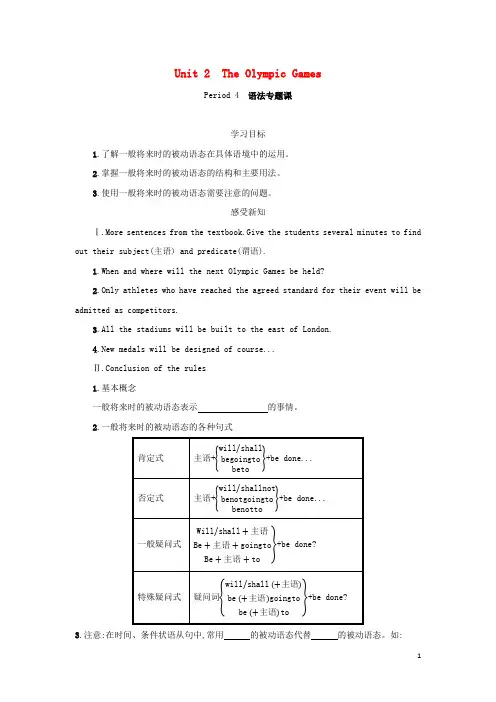
Unit 2 The Olympic GamesPeriod 4语法专题课学习目标1.了解一般将来时的被动语态在具体语境中的运用。
2.掌握一般将来时的被动语态的结构和主要用法。
3.使用一般将来时的被动语态需要注意的问题。
感受新知Ⅰ.More sentences from the textbook.Give the students several minutes to find out their subject(主语) and predicate(谓语).1.When and where will the next Olympic Games be held?2.Only athletes who have reached the agreed standard for their event will be admitted as competitors.3.All the stadiums will be built to the east of London.4.New medals will be designed of course...Ⅱ.Conclusion of the rules1.基本概念一般将来时的被动语态表示的事情。
2.一般将来时的被动语态的各种句式3.注意:在时间、条件状语从句中,常用的被动语态代替的被动语态。
如:When the dam is completed,the river will be controlled.大坝竣工后,这条河的河水将得到控制。
Ⅲ.Consolidation1.Fill in the blanks with the right form of the given words.(1)We (not punish) if we break the rule.(2)The exam (not put off).(3)His new novel (publish) next week.(4)The sports meet (hold) on April 10th.(5)The problem (discuss)at tomorro ’s meetin .2.Translate the sentences into English.(1)这些旧建筑什么时候被拆除?(2)我不会因为自己的错误而受到父亲的惩罚。
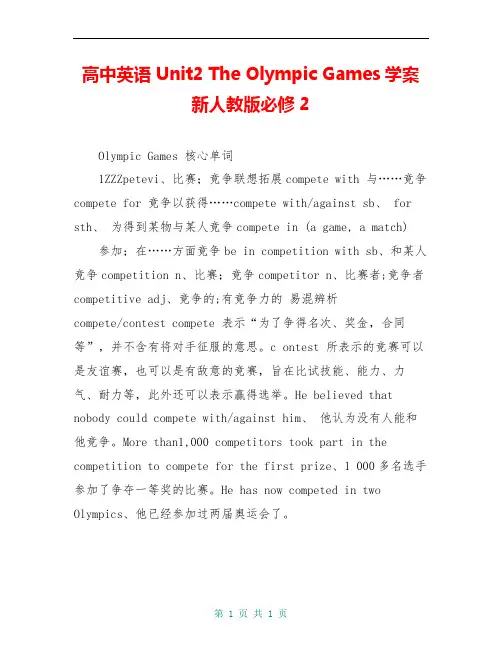
高中英语 Unit2 The Olympic Games学案新人教版必修2Olympic Games 核心单词1ZZZpetevi、比赛;竞争联想拓展compete with 与……竞争compete for 竞争以获得……compete with/against sb、 for sth、为得到某物与某人竞争compete in (a game, a match) 参加;在……方面竞争be in competition with sb、和某人竞争competition n、比赛;竞争competitor n、比赛者;竞争者competitive adj、竞争的;有竞争力的易混辨析compete/contest compete 表示“为了争得名次、奖金,合同等”,并不含有将对手征服的意思。
c ontest 所表示的竞赛可以是友谊赛,也可以是有敌意的竞赛,旨在比试技能、能力、力气、耐力等,此外还可以表示赢得选举。
He believed that nobody could compete with/against him、他认为没有人能和他竞争。
More than1,000 competitors took part in the competition to compete for the first prize、1 000多名选手参加了争夺一等奖的比赛。
He has now competed in two Olympics、他已经参加过两届奥运会了。
高手过招(1)单项填空 Our athletes will some games, such as running and wrestling、 They have the hope to get some gold medals、(xx12江西南昌一中检测)A、 competeB、 compete inC、 JoinD、 attend (2)用方框内所给短语的适当形式填空(原创)compete with/compete against/compete for/compete in①It’s difficult for small markets to big ones、②Will you the100-metre race?③The two athletes will the gold medal、解析:(1)选B。
学习过程一、课堂导入本单元我们将在原有知识的基础上学习新的单词和词组,扩大词汇量和知识面,进一步提高英语水平。
英语学习需要从“听说读写”各个方面着手,提高整体运用能力二、复习预习教师引导学生复习上节课所学的重点单词和短语词语辨析1. make sure/be sure/for sure2. in charge of/in the charge of3. compete / contest4. basis / base / foundation词形变化1. advertise vt. 做广告; 登广告advertisement n. 广告advertising n. 做广告(作定语)2. replace v. 代替, 取代replacement n. 代替, 取代replaceable adj. 可代替的;3. interview v. n. 面试, 面谈; 采访interviewee (面试中)受审核者; 被接见者; 被采访者 interviewer主持面试者; 接见者; 采访者重点单词1. admit vt. & vi. 许可某人/物进入;接纳,接受某人(入院入学等);承认,招认2. charge n. 费用;v. 指控;收费3. bargain n.协议;廉价物;v.(与某人)讨价还价; 洽谈成交条件; 谈判4. promise v. & n. 允诺;答应5. deserve vt. & vi. 应得; 值得重点词组1. take part in参与;参加2. stand for stand for 代表;象征;表示3. used to 过去常做某事4. one after another one after another/the other 一个接一个地重点句子1. How often do you hold your Games?2. No other countries could join in, nor could slaves or women三、知识讲解知识点1:重点句型1. I lived in what you call “Ancient Greece” and I used to write about the Olympic Games a long time ago.我生活在你们所说的“古希腊”,我曾经写过很久以前的奥林匹克运动会的情况。
高中英语 Unit 2 The Olympic Games学案2新人教版必修2The Olympic Games学案2(无答案)新人教版必修2班级授课时间12、4教师(学生)教学目标知识与技能全方面了解奥运过程与方法自主学习&合作探究情感态度与价值观激情投入,高效参与课堂,体验用英语表达情感的快乐。
重点∕难点重点:与奥运主题相关的表达;难点:It’s …that…的用法。
教学方法模仿→归纳→总结学生自学反馈教学过程新知导学备注1、Words and expressions learn:adj、古代的;古老的vi、比赛;竞争 n、奖章;奖牌 n、志愿者n、祖国 v、承认adv、现今 v、主办n、运动员 v、主管2、The style of the passage:(体裁)Interview ↙ ↘ interviewer:___________ interviewee: ___________→for the purpose of :getting information about ___________ Olympic Games、合作探究备注Group DiscussionHow many questions are there in theinterview?Q1:Q2:Q3:Q4:Q5:Q6:归纳拓展1、Only athletes…will be admitted as competitors、(L16)2、 Greek cities used to compete against each other for honor、(L26)3、 Women play a very important role in team sports、(L30)4、 in charge of (负责)/ in the charge of(由…负责)疑难句式:It’s +被强调部分+that/who +其它…当堂训练备注情景训练:图片(略)P1:________________________________________(船长:Captain)Titanic 号能容纳3000多人。
高中英语 Unit2 The Olympic Games Unit2 The Olympic Games导学案新人教版必修2Olympic Games 导学案Unit2 The Olympic Games----- Reading1 Learning objectives:1、Talk about Olympic Games2、 Enable students to learn about the difference and the similarities between ancient Olympics and modern Olympics、3、 Enable students to give opinions on hosting Olympic Games、The Olympic motto: I、 Warming upWork in pairs and ask each other the following questions、1、Where did the ancient Olympic Games start?2、 How many countries competed in the ancientOlympic Games?3、 Who could not take part in the ancient Olympic Games?4、 When and where did the modern Olympic Games start?5、Who was China’s first gold medal winner and for what event?6、 What are the three words that show the spirit of Olympic Games?7、 What do the five rings on the Olympic flag stand for?8、 What are the official mascots for the Beijing Olympics?II、 Reading1、pre-readingLook at the title and the pictures and predict the content、 Then read it quickly and see if you were right、2、 ReadingWhat does the passage tell us? the ancient Olympic Games ()the modern Olympic Games ()good & bad effects of the OG ()the similarities between them ()the differences between them ()3、 Careful reading Read the passage carefully and tell t he statements True or False① The olive wreath has been replaced by money、()②The Olympics were not always held in Greece2000 years ago、()③At first, Pausania thinks people may be competing for money in the modern Olympic Games、()④Pausania is surpris ed to know that women are to take part in the modern Olympic Games、()⑤We feel proud because we have finally got the chance to hold the Olympic Games、()⑥Horse riding events belong to the Winter Olympics、()⑦Ancient Greek cities competed against each other for money、()⑧The village built for Olympic athletes ismade up of a main reception building, several stadiums and a gymnasium、()⑨xx Olympics will be held in London、() Read the passage carefully and answer the following questions、1 What amazes Pausanias about the Olympic Games?2 Why does he think Athens and Beijing should feel proud?3 Why does he think people may be competing for money in the modern Olympic Games?III、SummaryThe Olympic Games are the biggest sports meetingin the world, which include two kinds, the ________ and the ______ Olympics、 Both of them are ____ every _________、 All countries can take part if their athletes are _____ _______ to the games、 Women are not only _______ to join in but playing a very _________ role、 A ______ ______ is built for the competitors to live in, a________ for competitions, a large swimming pool, a___________ as well as seats for those who watch the games、It’s a great ______ to host the Olympic Games、The Olive wreath has been ________ by medals、But it’s still about being able to run _______, jump _______ and throw _______、IV、 DiscussionWhy do so many countries want to host the Olympic Games while other do not?V、Sentence structure1、Pausanias, who was a Greek writer2,000 years ago, has come on a magical journey on March18th, xx to find out about the present-day Olympic Games、Pausanias是2000年前的一位希腊作家,他在xx年3月18日做了一次魔幻的旅行,来打听当代奥林匹克运动会的情况。
Unit2 重点句型
Written by Yanfei
1.我居住在大家通常所说的古希腊,过去我常常写有关奥林匹克的文章。
(Line 5, Page 9)
______________________________________________
______________________________________________________.
what you call____________________
used to do _________________ be used to do________________
be/get used to doing________________
仿句:①经过几天的旅行,他们到达了一个叫做撒哈拉大沙漠(Sahara)的地方。
____________________________________________________
②我们得不到的东西总是看起来比我们所拥有的东西要好。
__________________________________________________________
③这些木头可以用来做一张书桌。
__________________________________________________
④我仍然不习惯早起。
___________________________________________________
⑤这个男人习惯了农村的生活。
__________________________________________________
2.只有运动员达到了奥委会认同的标准要求才会被允许成为竞赛者。
(Line15, Page10)___________________________________________________________
-- reach the agreed standard ________________________
agreed是单个过去分词作前置定语,the agreed standard = t he standard which is agreed (by everyone) be admitted as ________________ be admitted into..____________________
把那个被换下来的花瓶扔了吧。
_____________________________________.
被打败的队伍失望地离开了。
____________________________________
他被录取到一所重点大学是不可能的。
_____________________________
3.这就是运动会被叫做冬奥会的原因。
(Page10)
_______________________
⇨句型:That is why...这就是为什么……;这就是……的原因
◆模仿造句
(1)这就是我来参加比赛的原因。
_____________________________________________________________________
(2)这就是为什么运动员必须达到大家认可的标准的原因。
_____________________________________________________________________
4.在夏季的奥运会上,你可以参加跑步、游泳和帆船比赛以及所有的团队比赛。
(Line22, Page10) ______________________________________________________
__________________________________________.
【分析】这是一句强调句,强调时间状语in the Summer Olympic。
【练习】
(1) 就是用这种方式他才解决了那个难题的。
_____________________________________________________
(2) 是不是就是从他那里你才学会怎样感恩的?
__________________________________________________
5.并不是所其他国家都不能参加奥运会,奴隶和妇女也一样。
(Line 27, Page10)
____________________________
【分析】nor 用作连词,引起部分倒装句,意为“也不”。
【练习】
(1) 我不知道,我也不在乎。
_______________________________________
(2) 她再也没有和他说话,也没有写信去道歉。
___________________________________________
. I didn’t go there. _______________her. (她也是)
(2). She was a teacher. _________I. (我也是这样)
(3). I’m a student and I like English. ______________him. (他也是如此)
6.Women are not only allowed, but play a very important role in gymnastics, athletics, team sports and … (Line 30, Page 10)
【分析】not only…but also…不仅……而且……(其中also可以省略),连接两个主语时,谓语动词遵循就近原则;引导两个并列分句时,如果把not only引导的分句置于句首,此分句需倒装。
【练习】
(1) 他不但喜欢物理,也对历史很感兴趣。
(倒装)
__________________________________________________________
2) 不单单是她,就连她的父母也对艺术节充满了期待。
____________________________.
7.赢得奥运会主办权和获得奥运奖章一样的竞争激烈。
(Line 39, Page10)
________________________________
【分析】as… as…表示同级比较,asmuch+a/an+名单+as
1)我们邻居家的房子不如我们的大。
Our neighbour doesn’t have ______ big a house ______ ours.
2)人们通常认为教育既是一门科学也是一门艺术。
It is generally believed that teaching is ______ ______ an art ______ it is a science.
◆ 模仿造句
3)保护环境与发展经济在我国同等重要。
_____________________________________________________________________
1.古代奥林匹克运动___________________2. 一个接一个地______
3. 作为……被接纳_________ 4. 应受惩罚_________
5. 每隔一天____________________
6. 起重要作用________
7. 代表,象征,表示 _______________8. 金牌获得者___________________
9. 作了一次魔幻旅行_________________________10. 负责 _________________
11. 一套______________________
12. replace … with … ______________________
13. make a bargain with sb. _________________
14. on a regular basis __________________
15. physical health _____________________
16. promise to do sth. _____________________。